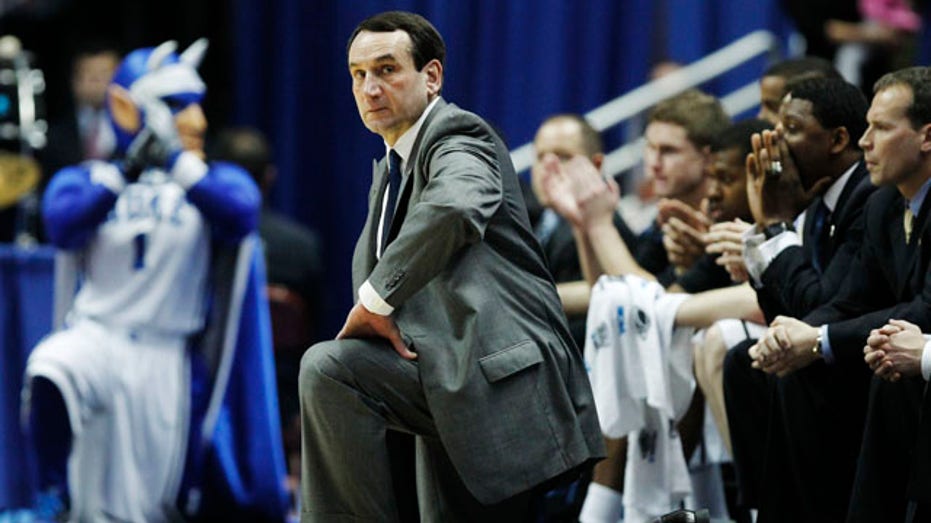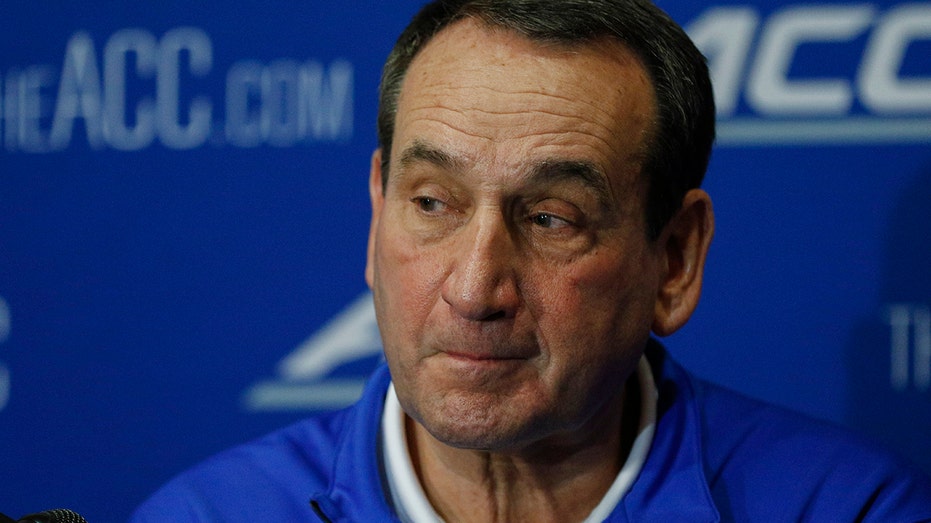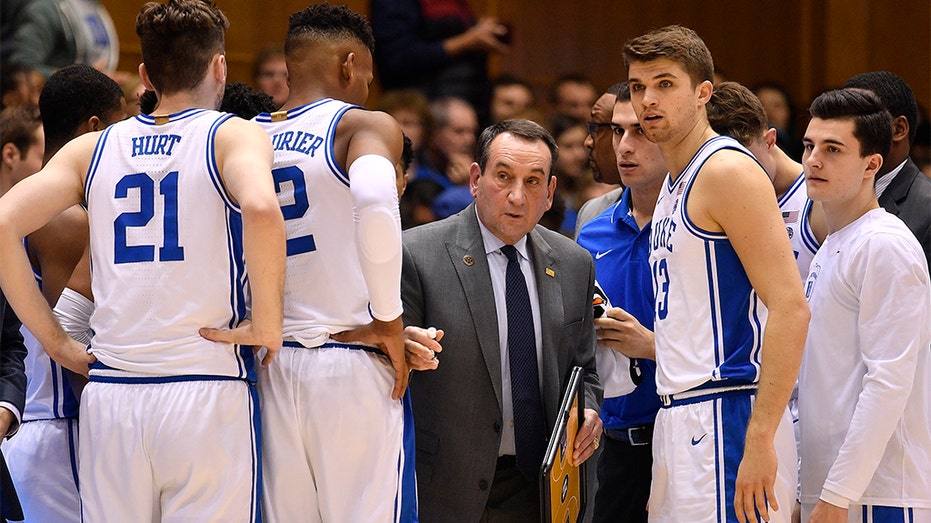Coach K’s last game at Duke spawned a $20M real estate bubble
The average ticket for Coach K's final home game costs $7,400, making it the most expensive regular-season game for any sport in SeatGeek’s records
The hottest real estate market in the country right now is a muddy patch of campground next to a basketball arena in Durham, N.C., where a bunch of tents are suddenly worth hundreds of thousands of dollars each.
Their owners aren’t selling. They can’t. Those homes also happen to be their tickets to Mike Krzyzewski’s last home game at Duke.
Every year, Duke students pitch tents and spend months sleeping outside for the chance to see the annual game against rival North Carolina, taking advantage of a remarkable deal: They get the best seats in the house for free.
That prime real estate has never been worth so much. This year, they’re roughing it for Krzyzewski’s final home game before the winningest coach in men’s college basketball retires, and tickets for the last regular-season stop on his farewell tour are fetching Super Bowl prices.
With a dozen students per tent, and hundreds of tents next to Cameron Indoor Stadium, the economy of Krzyzewskiville is so booming that even math majors like Rebecca Bell can’t wrap their minds around the numbers: The property inside this tent village would be appraised for about $20 million.
"It is kind of mind-blowing to think about the value of our tickets," says Bell, a senior who will be standing in the front row at half-court on Saturday.

Duke Blue Devils coach Mike Krzyzewski looks on as his team plays against the Arizona Wildcats during an NCAA West Regional college basketball game in Anaheim, Calif., March 24, 2011. (REUTERS/Lucy Nicholson )
FORMER RAIDERS COACH JON GRUDEN'S LAS VEGAS MANSION UNDER CONTRACT
The closest proxy for student-section prices is $17,000, the most expensive ticket resold for this game, according to SeatGeek. But that much cash only buys a spot in the middle of the upper bowl above where the undergraduates bounce. The market rate for a free courtside seat to this game is likely closer to $20,000, which is more than Duke students pay in room, board and fees.
But they can’t scalp their tickets, partly because they get customized wristbands, not tickets, and must pass detailed security checks before they rush the stands.
There is so much competition for so little space in this exclusive hamlet that each square foot of Krzyzewskiville is worth about $1,000, says Chris Glynn, Zillow’s senior managing economist.
"That’s comparable to typical home values per square foot in Palm Beach, Vail or Southampton," said Glynn, who earned his Ph.D. at Duke.
The most expensive Duke vs. UNC game until now was in 2019, when former President Barack Obama visited and Zion Williamson’s shoe exploded. The average seat that night sold for $3,300, according to SeatGeek. But the highest price in the rivalry’s history looks like a bargain today. The cheapest seat for Krzyzewski’s final game in Cameron is $3,600. The average ticket: $7,400. That makes it the most expensive regular-season game for any sport in SeatGeek’s records.
When tickets for sporting events cost outrageous amounts, the problem is usually demand. But at Duke, the problem is also supply.
More than 70,000 fans attended the Super Bowl, but the official capacity of the basketball arena nestled in a corner of Duke’s campus is 9,314. Even that tiny number exaggerates the inventory because 1,300 courtside seats in the rickety wooden bleachers are reserved for students.

Duke basketball coach Mike Krzyzewski listens to a question during Atlantic Coast Conference media day in Charlotte, N.C., Oct. 8, 2019. (AP Photo/Nell Redmond)
HOCKEY EQUIPMENT GIANT CCM TO STOP USING ALEX OVECHKIN, OTHER RUSSIAN PLAYERS IN GLOBAL MARKETING
But first, those students have to live in a tent.
The territory outside Cameron Indoor Stadium was colonized in 1986, when the founding mothers and fathers of Krzyzewskiville visited a local U-Haul store the week of the UNC game and left with every piece of camping equipment in stock. The total price of the four tents was less than $80. This weekend, each of those tents would be worth more like $200,000.
An idea hatched over beer soon became a distinctive part of Duke. It isn’t quite camping, but it isn’t exactly glamping. Students squeeze multiple sleeping bags into tents and brave cold spells, econ homework and drunk neighbors. Long before COVID, they survived norovirus, flu, the occasional case of meningitis, lovesickness and heartbreak.
The sovereign nation known as K-ville remains governed by an arcane set of laws enforced by a group of student overlords called Line Monitors, who grace tenters with reprieves in freezing temperatures and blare sirens in the middle of the night to ensure that a certain number of students from each tent are present.
They’re also in charge of the tests students have to ace before they’re given the right to sleep out in the cold.
The students broke from decades of K-ville precedent in 2017, amended the rules and instituted another system of allocating tenting spots: They made themselves pass a test. The first test in January determined which students would be granted the right to tent for the longest. And the number of Duke students who applied for tenting privileges mirrored the spike in ticket demand for this year’s UNC game.
In 2019, when Obama made the pilgrimage and Williamson’s sneaker detonated, 150 teams of 12 potential Cameron Crazies took the exam. That seemed crazy. This year was crazier: There were 174 teams competing for the first 70 spots.
That means roughly one-third of Duke’s undergraduates spent parts of their holiday break studying for an hour-long exam that would have 67 trivia questions like: "What is the sex of Jon Scheyer’s next baby? Describe the gender reveal."

Head coach Mike Krzyzewski of the Duke Blue Devils huddles with his team during the first half of a game against the Boston College Eagles at Cameron Indoor Stadium Dec. 31, 2019, in Durham, N.C. (Grant Halverson/Getty Images)
DEREK JETER STEPS DOWN AS MARLINS CEO, SHAREHOLDER
Like most tales of market frenzies these days, the prices in K-ville reflect the pandemic’s forces. The supply of student tickets remained the same this year, but the demand also spiked because of what happened last year: With no fans at games, COVID made K-ville a ghost town.
That meant half of Duke’s undergrads could tent for the first time, including Erika Pietrzak, who has known about the school’s peculiar tradition for her entire life: Her mother, Kimberly Reed, was one of the original settlers. She became a second-generation K-ville citizen when she moved into Tent 111. "No matter where I am in the crowd, it’s going to be worth it," says Pietrzak, who’s planning to wear chunky platform shoes to make sure she can see the game.
The students who aced the midterm to earn one of the first 70 spots then had to pass their final exam: a six-part test administered last week to determine the order of tents. Those with the highest scores would be guaranteed a position in the front row at center court inches from the action.
As a line monitor appointed the co-vice president of tenting, Ben Randoing’s power came with a great responsibility: He wrote the tests. Randoing noticed that seats in Cameron’s upper level were selling for a minimum of $3,500 on the secondary ticket market, and he estimated the real estate reserved for students would go for at least five times that amount.
The biomedical engineering major did the math and realized that his sheets of paper were putting millions at stake.
But anywhere there is money, there is potential for graft. Randoing says people approached him offering shady deals to get an early copy of the exam, and he turned down bids of thousands of dollars to keep the contents secret.
"They were extremely valuable assets," he said. "People were willing to do a lot of things to get their hands on the test."
CLICK HERE TO READ MORE ON THE FOX BUSINESS
Rebecca Bell didn’t have to cheat her way to a high score. She had experience on her side. Bell tented when she was a freshman, but her group earned one of the last slots, and she couldn’t take that risk this year. The senior math major picked a tent of friends she knew would be dedicated enough to sacrifice academics, hygiene and sanity to get a top spot.
Bell and her tentmates each spent 130 hours in their tiny home over the course of two months, according to a spreadsheet where they rigorously tracked their time logged in the tent. They might have spent even more time prepping for the exam. The tent that named itself DumbleMoore’s Army, after the Hogwarts headmaster and Duke captain Wendell Moore, put in two weeks compiling a study guide before cramming for four straight days. It paid off.
When the final tests were graded, they were given a deed to the most valuable real estate in sports: Tent 1.
Click here to read more on the Wall Street Journal




















